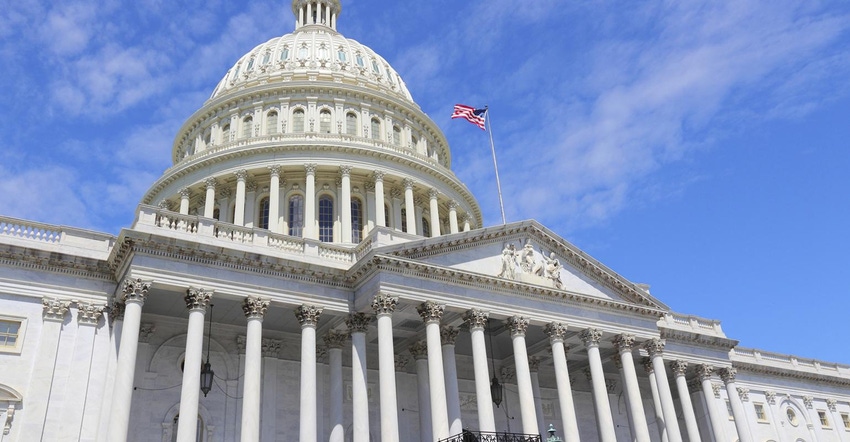
Senate Agriculture Committee Chairwoman Debbie Stabenow, D-Mich., says she and her House counterpart House Agriculture Committee Chairman David Scott, D-Ga., and other Democrat colleagues are working daily on how to prioritize agriculture priorities with the $135 billion to be included in the $3.5 trillion budget resolution package. However, Republican members are not being included in those discussions.
The House voted Aug. 24 in a 220-212 party-line vote to advance the $3.5 trillion budget reconciliation blueprint, the same blueprint that passed two weeks prior in the Senate. The vote on the blueprint was delayed by a group of 10 moderate House Democrats who wanted an immediate vote on the Senate-approved bipartisan infrastructure bill before starting work on the more partisan reconciliation infrastructure package. Democratic leadership was able to strike a deal with the group to advance the budget reconciliation bill blueprint in exchange for a September 27 deadline for a vote on the bipartisan infrastructure bill.
The votes pave the way for committees to start drafting the details of the budget framework into legislative text, with a September 15 deadline to submit each committee’s provisions to their respective chamber’s Budget Committees. It is anticipated that the House Agriculture Committee will hold its markup on September 10.
Stabenow says contrary to the bipartisan infrastructure bill, unfortunately the budget resolution package has been “defined as partisan” and Senate Minority Leader Mitch “McConnell announced very early no Republicans would vote for it.”
In response to Republicans’ request for hearings on ag issues, Stabenow says no hearings will be held because there’s no possibility of Republican support. “We’ll be working with members who are open to voting for this proposal in both the House and Senate,” she says.
Related: Ag needs bipartisanship in reconciliation process
Stabenow didn’t give an exact breakdown on how the leaders are looking to divide out the $135 billion, but committees have been given a specific charge around identified goals including climate, nutrition and wildfires. She says one of her early concerns with President Biden’s American Jobs Plan was just $1 billion for climate-smart agriculture.
In a media call Aug. 25, Stabenow says she can guarantee that funding for climate-smart agriculture will be much higher than the originally proposed $1 billion. “I don’t want to get into exact numbers, but it’s going to be enough to really move forward in a robust way,” she says. “I feel very good about where we will be.”
She says they’ve been reaching out to commodity groups and others. A predominant focus is on expanding traditional conservation programs previously written into past farm bills.
The Food and Agriculture Climate Alliance, consisting of over 80 organizations representing farmers, ranchers, forest owners, agribusinesses, manufacturers, the food and innovation sector, state governments, sportsmen and environmental advocates, wrote a letter to leadership noting they recognize this reconciliation package offers a significant opportunity to increase funding for voluntary, incentive- and science-based climate and conservation programs.
FACA says the package must also protect existing farm bill programs and do no harm through tax changes that threaten the economic sustainability and resilience of multi-generational family farms, working forests and lands and the entire food supply chain.
The National Sustainable Agriculture Coalition along with 62 farming, environmental and rural development organizations sent a separate letter to Senate Majority Leader Chuck Schumer, D-N.Y., House Speaker Nancy Pelosi, D-Calif., Stabenow, and Scott, calling for a robust reconciliation package that advances climate friendly agriculture, food systems and equity.
The letter asks specifically for at a minimum:
$30 billion for conservation programs with a focus on climate-friendly agricultural practices and systems that increase resilience to climate change, improve the health of workers, communities, and soil, protect water and air quality, increase biodiversity and help store carbon in the soil
$5 billion for sustainable and organic agriculture research programs focused on climate resilience related research, education, and extension programs with strong dedicated support for 1890s and 1994 Land Grant Institutions
$3 billion to support resilient rural development through investments in community-based infrastructure focused on value-added agriculture, rural renewable energy and infrastructure for local processing of crops and livestock to improve food system resilience and better support small and medium-scale farmers
$10 billion for debt relief to stabilize the operations of producers who have not received a fair share of aid from recent federal support programs.
According to a notice from Michael Best Strategies, with small Democratic majorities in both the House and Senate, the next weeks and months will see a very delicate negotiation – Speaker Pelosi can only afford to lose three votes and Senate Majority Leader Schumer can’t afford to lose any. For instance, Sens. Joe Manchin, D-W.V., and Kyrsten Sinema, D-Ariz., have already voiced strong concerns about the $3.5 trillion price tag.
“This makes the overall timeframe tough to nail down,” MBS says.
On Tuesday, Pelosi committed to passing the budget reconciliation bill by September 27. Later that day, House Majority Leader Steny Hoyer tried to walk back that goal. “There’s no deadline,” he told a reporter, according to a Capitol Hill pool audio. “We’re gonna pass [reconciliation] whenever we pass it; October 1, October 10, October — we’re gonna pass it.”
About the Author(s)
You May Also Like






